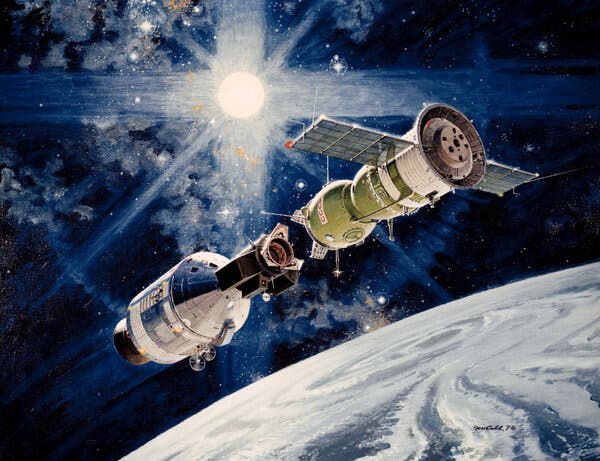
On July 17, 1975, a historic moment unfolded in space that would redefine international cooperation in the realm of human exploration. Approximately 140 miles above France, American astronauts aboard the Apollo spacecraft opened a hatch to greet their Soviet counterparts from the Soyuz. Col. Thomas Stafford, representing NASA, and Brig. Gen. Alexei Alexeyevich exchanged a handshake that resonated far beyond the confines of their docked spacecraft.
This simple yet profound gesture came during the Apollo-Soyuz Test Project, marking the first international human spaceflight. It symbolized a unique partnership between two nations previously locked in a fierce space race and ideological rivalry. The event was broadcast to millions around the globe, showcasing a moment of unity and collaboration during a time of geopolitical tension.
Asif Siddiqi, a professor of history at Fordham University and an expert on Russian space history, reflects on the significance of that handshake. “It’s amazing to think that two diametrically opposed countries with different systems and cultures, essentially ready to destroy each other, can somehow cooperate and do this highly technical, complicated mission,” he stated, underscoring the importance of the Apollo-Soyuz mission as a pivotal step towards peaceful space exploration.
Legacy of Apollo-Soyuz
The Apollo-Soyuz mission set the foundation for future international collaborations in space. Following this initial partnership, the space agencies of various nations have worked together on numerous projects, culminating in the establishment of the International Space Station (ISS). The spirit of cooperation initiated by the Apollo-Soyuz project continues to influence how nations approach space exploration today.
In the decades since, the handshake between Stafford and Alexeyevich has become a symbol of hope and potential for collaborative endeavors in space. It serves as a reminder that even the most bitter rivals can find common ground when faced with the vastness of the universe. The legacy of this mission persists as modern astronauts from different countries work together aboard the ISS, demonstrating that the ideals of peace and cooperation can transcend borders.
As we commemorate the 50th anniversary of the Apollo-Soyuz Test Project, it is essential to reflect on its impact on international relations and space exploration. The mission not only advanced our understanding of space but also laid the groundwork for a more collaborative approach in addressing the challenges that lie ahead.
Today, as nations continue to explore the cosmos, the spirit of the Apollo-Soyuz handshake remains an enduring testament to the power of unity and cooperation in the pursuit of knowledge and discovery.






